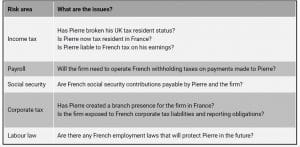The implications of remote and virtual workers
Since the pandemic there have been significant changes in working arrangements within professional firms. More and more return to work conversations are uncovering cross border elements, which could have potentially far reaching implications for the firm, the partners and employees.
In recent months, firms are seeing a boom in requests from its people to work all or part of their time remotely, from outside the country of their employment and on an extended or permanent basis. Much of this remote working was transient and a direct result of the travel restrictions imposed by the pandemic or returning to a country of origin in order to care for family members.
What issues could arise?
There are without doubt many positives brought about by remote and virtual work arrangements:
- better work/family life balance for people
- productivity gains for some firms
- potential access to global talent pools outside physical office locations.
However, the regulatory and HR related issues may not be straight forward. Remote and virtual workers potentially gives rise to issues across a number of areas including:
- payroll operation and reporting
- income tax liabilities in differing jurisdictions
- social security entitlement and liabilities in differing jurisdictions
- corporate taxation/permanent establishment risk
- immigration rules and right to work (or not!) in a different jurisdiction
- customer/client viability
- local employment law
- HR risk
- culture, values and impact on teams
- compensation and benefits.
Case study
Pierre is a lawyer employed by ABC LLP, a UK based law firm with no presence or offices outside the UK. He is a French national who has lived and worked in the UK.
In March 2020, with the worsening COVID-19 situation, he moved to France to be with his parents and started working remotely from his parents’ home in France.
Pierre did not think it was necessary to make his line manager aware of his change in circumstances.
In August 2021 the firm started to have conversations with their people regarding their thoughts on returning to the office.
As a result of this exercise:
- the firm discovers that Pierre has been working from France for over a year already
- Pierre requests approval from the firm to make this a permanent arrangement under the firm’s flexible working policy.

Actions to take
First and foremost, firms need to put in place a process to establish where their people are based and for what period. Only then will the firm be able to work out what if any actions need to be taken.
Firms will be able to take advantage of the positives from their people working remotely, but at the same time manage and minimise the risks.
For more information on the issues outlined in this article or to discuss your firm’s position, get in touch with us today.
Nick Latimer – Cheltenham Office





